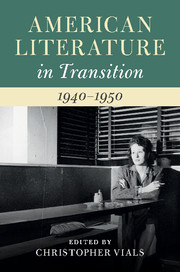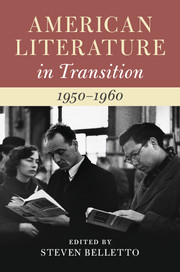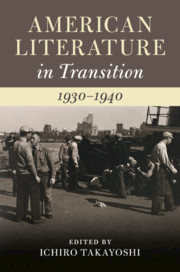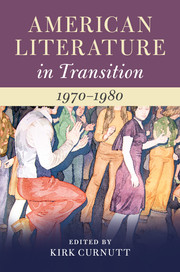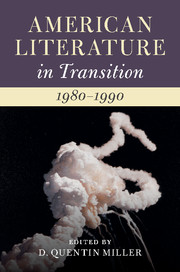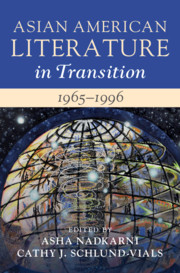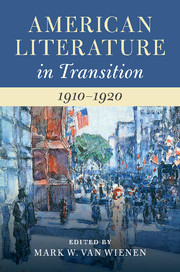American Literature in Transition, 1940–1950
Part of American Literature in Transition
- Editor: Christopher Vials, University of Connecticut
- Date Published: December 2017
- availability: This ISBN is for an eBook version which is distributed on our behalf by a third party.
- format: Adobe eBook Reader
- isbn: 9781108548601
Find out more about Cambridge eBooks
Adobe eBook Reader
Other available formats:
Hardback
Looking for an inspection copy?
Please email [email protected] to enquire about an inspection copy of this book
-
In the aftermath of World War II, the United States emerged as the dominant imperial power, and in US popular memory, the Second World War is remembered more vividly than the American Revolution. American Literature in Transition, 1940–1950 provides crucial contexts for interpreting the literature of this period. Essays from scholars in literature, history, art history, ethnic studies, and American studies show how writers intervened in the global struggles of the decade: the Second World War, the Cold War, and emerging movements over racial justice, gender and sexuality, labor, and de-colonization. One recurrent motif is the centrality of the political impulse in art and culture. Artists and writers participated widely in left and liberal social movements that fundamentally transformed the terms of social life in the twentieth century, not by advocating specific legislation, but by changing underlying cultural values. This book addresses all the political impulses fueling art and literature at the time, as well as the development of new forms and media, from modernism and noir to radio and the paperback.
Read more- Features canonical, non-canonical, and emergent authors of the 1940s
- Uses literature to highlight the historical open-endedness of the period, allowing readers to see that transitions such as the move from WWII antifascism to Cold War anticommunism was not inevitable, but contested and negotiated via works of the imagination
- Is attuned to the transnational turn in American literary studies and American studies, allowing readers to see 'American literature' as global project, one that intervened not only in a rarefied world of arts and letters, but in US projects outside its borders
Customer reviews
Not yet reviewed
Be the first to review
Review was not posted due to profanity
×Product details
- Date Published: December 2017
- format: Adobe eBook Reader
- isbn: 9781108548601
- contains: 4 b/w illus.
- availability: This ISBN is for an eBook version which is distributed on our behalf by a third party.
Table of Contents
Part I. The United States in the World:
1. Why We Fight: contending narratives of the Second World War Christopher Vials
2. Human rights in American political discourse Glenn Mitoma
3. Fictions of anti-semitism and the beginning of Holocaust literature Josh Lambert
4. The fatal machine: the postwar imperial state and the radical novel Benjamin Balthaser
5. Antifascism as a political grammar and cultural force Christopher Vials
6. From confession to exposure: transitions in anticommunist literature Alex Goodall
7. The contested origins of the Atomic Age and the Cold War Christian Appy
Part II. Emergent Publics:
8. Cross currents: WWII and the increasing visibility of race Bill Mullen
9. Good Asian/bad Asian: Asian American racial formation Floyd Cheung
10. Social realism, the Ghetto, and African American literature James Smethurst
11. From factory to home? The crisis in the gendered division of labor Julia L. Mickenberg
12. Public excursions in fierce truth-telling: literary cultures and homosexuality Aaron Lecklider
13. Resurgence: conservatives organize against the new deal Kathy Olmsted
Part III. Media and Genre:
14. Late modernisms, latent realisms: the politics of literary interpretation Sarah Ehlers
15. The city in the literary imagination Sean McCann
16. Noir and the ebb of radical hope Alan Wald
17. Narrating the war Philip Beidler
18. Paperbacks and the literary marketplace Erin Smith
19. Literary radicals in Radio's public sphere Judith Smith
20. The state cultural apparatus: federal funding of arts and letters Joan Saab.
Sorry, this resource is locked
Please register or sign in to request access. If you are having problems accessing these resources please email [email protected]
Register Sign in» Proceed
You are now leaving the Cambridge University Press website. Your eBook purchase and download will be completed by our partner www.ebooks.com. Please see the permission section of the www.ebooks.com catalogue page for details of the print & copy limits on our eBooks.
Continue ×Are you sure you want to delete your account?
This cannot be undone.
Thank you for your feedback which will help us improve our service.
If you requested a response, we will make sure to get back to you shortly.
×
